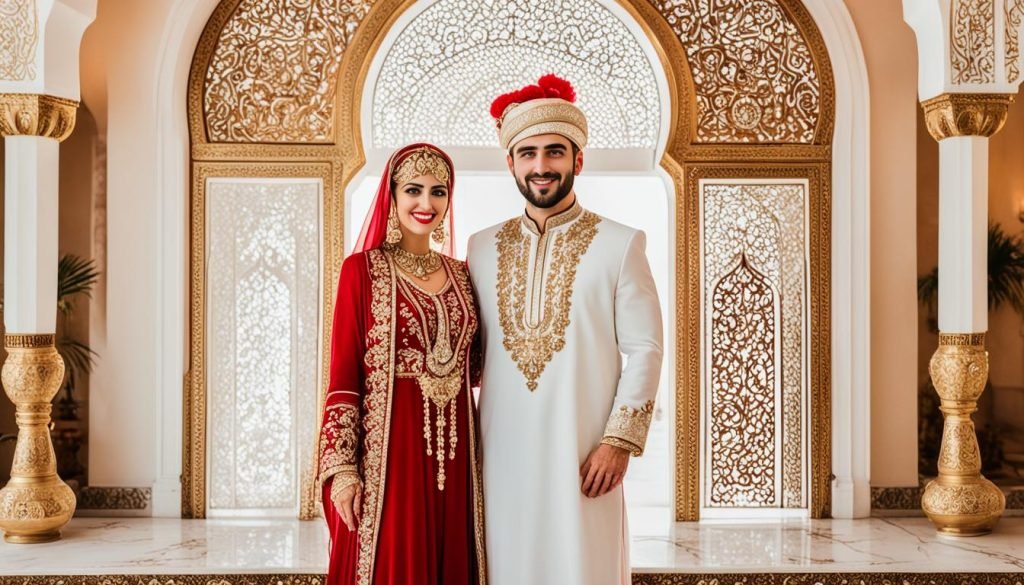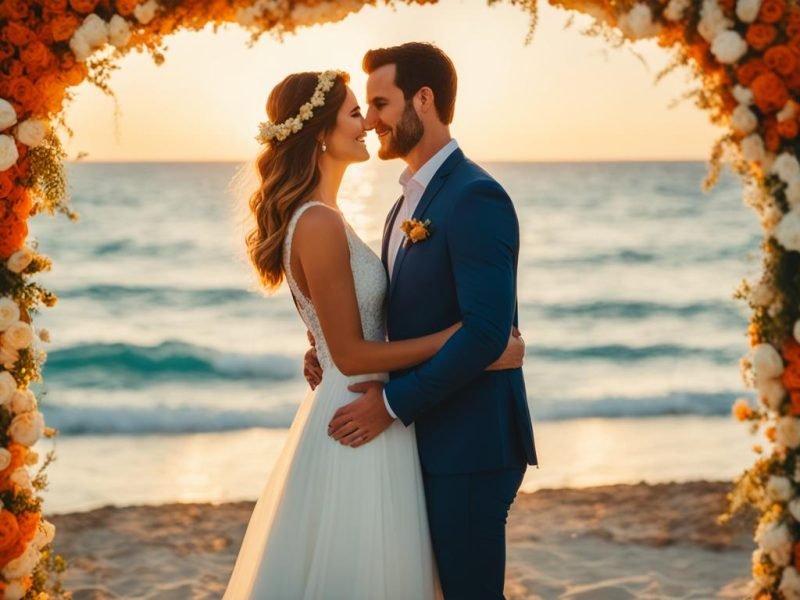Standing at the crossroads of tradition and new starts is often moving. I remember a good friend’s dream to merge the romance of Mediterranean winds with a promise of unity. She wondered, “Can you get married in Tunisia?” This led to the discovery that her dream was possible in North Africa’s vibrant settings. As a British person wanting to wed in Tunisian culture, she had to learn the local marriage laws. She also needed to understand the requirements for foreigners wanting to marry there.
Preparing for a wedding abroad takes a lot of knowledge and careful planning. Her journey involved working with notarial services and understanding the importance of a ‘certificate of no impediment’. She had to prepare documents to make her dream come true. Every step highlighted the need to respect both feelings and legal needs.
Key Takeaways
- Understanding the requirements for a British national to marry in Tunisia is essential for planning your wedding.
- Familiarising yourself with Tunisia marriage laws ensures that your ceremony is legally binding and culturally sensitive.
- Affirming your marital status through a ‘certificate of no impediment’ and other necessary documentation is a crucial part of the process.
- British consulate services play an important role in providing notarial and documentary services for couples getting married in Tunisia.
- Appointments for consulate services are a prerequisite and can be scheduled on specific days for the convenience of prospective couples.
Understanding Tunisia Marriage Laws
Planning a wedding is exciting but also challenging. This is especially true when you’re looking at the laws in Tunisia. It’s important to understand the local laws to make sure your wedding goes smoothly. Things like age requirements and the types of marriages recognised are key to know.
Legal Age and Capacity to Marry
In Tunisia, you need to be at least 18 years old to get married. There can be exceptions if a judge agrees. This makes sure only those ready for marriage, both legally and emotionally, can take this big step.
Prohibition of Polygamy in Tunisian Law
Polygamy, or having more than one spouse, is often debated. But in Tunisia, the rule is clear – it’s not allowed. Breaking this rule leads to serious consequences. Respecting this law is vital in Tunisia.
Recognised Legal Unions
Couples must follow Tunisia’s laws to have their marriage recognised. They must have a ceremony officiated by a notary, as stated in Law No. 57 from August 1, 1957. This ensures their marriage is valid in Tunisia and possibly in other countries too.
Understanding the key laws is crucial for those planning a Tunisian wedding. It’s not just about the party. There’s also a legal side that involves commitments and following the country’s laws.
Exploring the Tunisian Wedding Process
Delving into a Tunisian marriage ceremony, we see a blend of legal steps and cultural traditions. It’s like a dance that leads to a lifetime together. I’ll show you how to prepare and what documents you need for a legal marriage in Tunisia.
Marriage Appointment Procedures
To start, couples need to book a meeting with a City Hall notary. In Tunisia, only these notaries can make your marriage official. Luckily, there are no residency or marriage ban requirements, making things faster.
Documents to Present at Your Appointment
Being ready for your notary meeting is crucial. You must bring certain documents, all in Arabic or French. These papers, except your passport, will stay with Tunisian records forever.
| Document | Description | Notes |
|---|---|---|
| Birth Certificate | Proof of Identity and Lineage | Essential Tunisian marriage document verifying your birth and nationality |
| Passport | Travel Document | Mandatory for foreign nationals; used for identification and travel purposes |
| Affidavit of Marital Eligibility | Marital Status Declaration | Confirms your eligibility to marry, free from any legal impediments |
| Medical Certificate | Health Verification | Not older than two months, declaring you’re free from contagious diseases |
| Divorce Decrees / Death Certificate | Documentation of Previous Marital Status | If applicable, must be provided to prove the dissolution of any previous marriages or the passing of a spouse |
Follow these steps and gather the needed documents for a smooth wedding process in Tunisia. By doing so, you prepare for a ceremony that not only follows the law but also celebrates Tunisian romance. This way, your special day will be an unforgettable start to your life together in Tunisia.
Navigating the Legal Marriage in Tunisia Requirements
Getting to know the getting married in Tunisia requirements is key for anyone wishing to wed in this lovely Mediterranean nation. The procedure involves legal documents and health checks. It’s important for foreigners to understand these requirements for a smooth marriage process.
Affidavit of Eligibility to Marry
Starting the marriage journey in Tunisia begins with an affidavit of eligibility. This proves one is free to marry and not wed elsewhere. It must be certified by a consul at the embassies to confirm you’re eligible to marry.
Prenuptial Medical Certificate
Getting a prenuptial medical certificate is another step for marrying in Tunisia. This certificate confirms that both people are free from contagious diseases and addictions. It helps ensure a healthy start to marriage.
Foreigner’s Marriage to a Tunisian National
When a foreign man marries a Tunisian woman, the legal conditions are quite open. Yet, marrying a Tunisian means getting special documents from the embassy. These are needed because of international marriage laws.

Since focusing on expatriate matrimonial issues, I’ve seen the importance of careful preparation. Tunisia’s beautiful setting is perfect for weddings. Yet, abiding by Tunisia’s marriage rules is essential for a true start to married life there.
Tunisian Marriage Documents and Certification
Getting married in Tunisia requires everything to be in perfect order. Couples need a certificate of no impediment for a legal marriage in Tunisia. This shows there are no legal problems with their marriage. Understanding how to get this certificate is key. It’s also important to have the marriage certificate translated and legalised for worldwide use.
Obtaining a Certificate of No Impediment
I’ve learned the British consulate helps a lot with the certificate of no impediment from the UK. This is vital for Tunisia marriage documents. The consulate gives information that you can show to Tunisian officials. This information explains how to legally marry in Tunisia.
Translations and Legalisations
If documents aren’t in English, they need translating by a professional. Then, these translations are certified. This means they are accepted as equal to the originals in Tunisia. UK public documents are then legalised by the UK Legalisation Office. This makes sure the documents are accepted in Tunisia and abroad for legal marriage in Tunisia.
| Document | Need for Translation | Entity Responsible for Legalisation |
|---|---|---|
| Certificate of No Impediment | No | UK Legalisation Office |
| Birth Certificate | Yes, if not in Arabic or French | Certified Translator / Legalisation Authority |
| Marriage Certificate | Yes, for use outside Tunisia | Certified Translator / UK Legalisation Office |
In the end, couples must make sure all their Tunisia marriage documents are right. The consulate helps, but it’s up to the couple to follow through. Accurate translation and legalisation set the groundwork for a legally sound marriage.
The Role of Consular Services in Tunisian Marriages
Getting the needed Tunisia marriage documents can seem tough for Brits wanting to marry in Tunisia. Thankfully, consular services for marriage in Tunisia provide vital help. This turns a complicated process into something straightforward.
My experience with British consulate assistance started with their detailed guidance on what documents to get ready. They made sure I knew exactly what to have notarised and verified. This prevented any surprises that could disrupt my big day.
The consulate goes beyond just advising; they witness the signing of documents, making them officially recognised in Tunisia. Since they can’t create documents, they focus on preparing and notarising them. This gives the documents the legal standing needed in Tunisia and the UK.
This is a simple overview of the documents and services the consulate offers:
| Document/Service | Role of Consular Service | Notes |
|---|---|---|
| Notarisation of Documents | Witnessing signatures | Seals and signs documents; does not draft them |
| Certificates of No Impediment | Oversees exchange | Makes sure documents are accepted in Tunisia |
| Data Protection Advice | Protects privacy | Follows data protection laws |
| Administrative Assistance | Advisory services | Makes sure everything follows Tunisian and UK laws |
The consulate also ensures that all their actions follow strict data protection laws. This shows their dedication to legal duty and protecting individual privacy.
As I went through the legal steps, the consulate’s advice was incredibly helpful. They are experts in both Tunisian and UK law. With their help, I was able to make sure my marriage paperwork was perfect. This let me enjoy the happiness of getting married without worrying about paperwork.
Tunisian Marriage Registration: Step-by-Step Guidance
Getting married in Tunisia requires understanding its laws and procedures. I’m here to guide you through the City Hall Registration process. This will ensure your marriage is legally recognised in Tunisia.

Submitting Documents at the City Hall Registry Office
Firstly, start by gathering all necessary documents for the City Hall Registry Office. You must present your birth certificate and valid passport. Both partners also need to offer a legal affidavit, proving you’re free to marry under Tunisian law.
Next, get a prenuptial medical certificate to show you’re free from specific diseases. This step is crucial for public health. If you were married before, you’ll need to provide divorce decrees or death certificates of former spouses.
If any document is not in English, you must have it officially translated. Paying close attention to document details will help the registration process go smoothly.
Document Retention in Tunisian Civil Files
After submitting your documents, they’ll be kept permanently in Tunisian civil files, except for your passport. This ensures your marriage is legally recorded in Tunisia. It’s a key part of the process.
For those planning to marry, follow these steps carefully. They will help you navigate through the paperwork. With patience and the right information, your marriage will be legally recognised in Tunisia. It brings your hearts and histories together.
Marrying a Tunisian: Cultural Considerations and Procedures
Planning to marry a Tunisian involves knowing their laws and unique culture. This journey includes the beauty of Mediterranean settings and the scent of jasmine. Wedding traditions play a big part. But people often forget them, focusing more on paperwork and Tunisian spouse visa requirements.
Tunisian marriages are full of ancient customs. Celebrations can last up to a week with many rituals. Firstly, there’s the ‘fatha’, a formal engagement. Then, the ‘wedding mahr’ shows the bride in beautiful clothes and jewellery. So, understanding these cultural aspects of Tunisian marriages is key.
Legally, marrying a Tunisian has changed. Now, Tunisian women can marry outside their religion. This is great for diversity, but it adds complexities. It means learning more about international partnerships and Tunisian spouse visa requirements.
| Cultural Element | Description | Relevance to Marriage Procedure |
|---|---|---|
| Families’ Blessing | Families give their blessing, often in the ‘fatha’ ceremony. | Getting family approval is a key step before any legal actions. |
| Wedding Attire | Brides wear hand-embroidered dresses, symbolising wealth and beauty. | It’s important to respect dress codes, showing acceptance of local traditions. |
| Legal Representation | A Notary or ‘Adoul’ must officiate the marriage in Tunisia to be legal. | A legal representative is needed, even for a proxy marriage. |
It’s crucial to be diligent, as some marry for visas and not love. Understanding the cultural and legal needs in marrying a Tunisian is important. It helps build a strong and happy life together. So, embark on this journey with an open heart and a careful mind.
Understanding Mixed Marriages and Tunisian Spouse Visa Requirements
Mixed marriages in Tunisia are becoming more common, blending cultures beautifully. Yet, they bring unique challenges, especially in bureaucracy. Laws around mixed marriages have changed over time, aiming to make things easier for Tunisian and international couples. Knowing the Tunisian spouse visa rules is crucial for those wanting to live in Tunisia after getting married.
Legal Changes Affecting Mixed Marriages
In 2017, Tunisia saw a major legal shift that helped mixed marriages. The ban on Tunisian women marrying non-Muslims was lifted, making it easier for these couples to marry. It’s important for international couples to understand these legal changes to respect both their love and the country’s laws.
Visa Implications After Marriage
After the wedding, couples must deal with visa issues and permits. It’s essential to follow the Tunisian spouse visa requirements accurately for a smooth start to married life. Both Tunisian and foreign documents are checked carefully to ensure the marriage complies with immigration laws.
| Requirement | Description | Documentation |
|---|---|---|
| Valid Passport | A current passport is necessary for identity verification. | Photocopy and original passport. |
| Marriage Certificate | Proof of the legal marriage in Tunisia. | Original certificate, translated if not in Arabic or French. |
| Residence Application | Filing for residence within Tunisia post-marriage. | Application forms, passport-size photos, and the relevant fees. |
| Spouse Visa | If residing outside of Tunisia, a visa application must be submitted. | Proof of marriage and financial stability may be requested. |
Mixed marriages in Tunisia and the visa needs demand thorough planning. As the world connects more, Tunisian laws evolve, showing respect for diverse cultures while maintaining legal standards. Those in such marriages should stay informed and follow the legal requirements for a harmonious beginning.
Marriage Ceremony in Tunisia: Traditions and Legal Formalities
Getting married in Tunisia means mixing legal steps with local traditions. The wedding combines serious legal vows and joyful local customs. It’s a beautiful blend of law and celebration.
Legal Formalities for a Valid Marriage Ceremony
Marriage in Tunisia is about love and following strict laws. I need to follow the Tunisian Personal Status Code carefully. This means showing birth certificates, IDs or passports, and a medical certificate. These steps lay the foundation for a joyful celebration.
Cultural Practices and Wedding Celebrations
The heart of a Tunisian wedding is its vibrant traditions. It’s a grand celebration of love. There are music-filled processions, group blessings, and dancing to darbouka beats. Delicious food delights everyone, and every look and gesture carries deep meaning.
Entering this swirling mix of law and tradition, I unite with my partner and a rich culture. The Tunisian wedding is a wonderful mix of legalities and legacies. By joining this ceremony, I add my story to Tunisia’s colourful heritage.
Conclusion
Getting married in Tunisia is a journey through complex legal steps and beautiful traditions. As a British person, I’ve learned how important it is to follow Tunisia’s marriage laws closely. This ensures our marriage is valid both here and abroad.
Having guidance from consulate services has been key in understanding the local legal needs. They help make sure our big day is recognized world-wide. It’s comforting to know we’re not just having a symbolic event, but a legally-bound celebration.
Mixing legal steps with Tunisian wedding customs creates a truly special celebration. If you’re thinking of marrying in Tunisia, respecting the law and the local culture is crucial. It makes the wedding both meaningful and genuinely Tunisian, a moment you’ll always remember.







